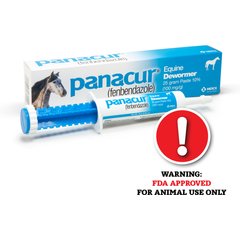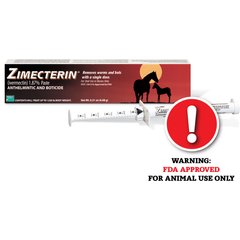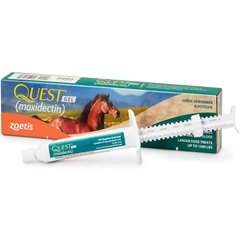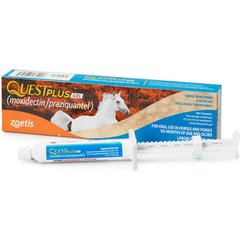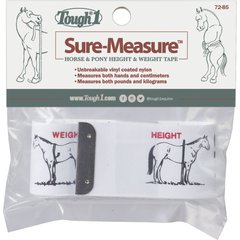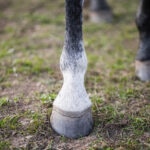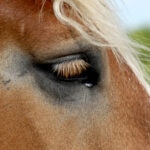What Are Horse Dewormers? And Why Do Horses Need Them?
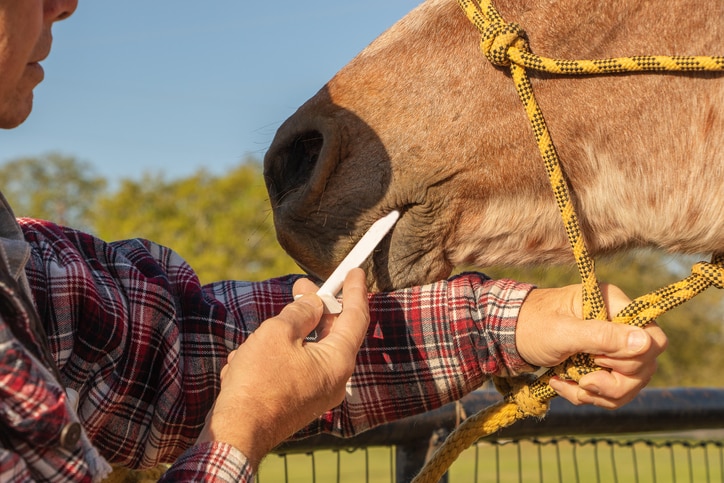
Photo by Debra Lawrence/iStock / Getty Images Plus via Getty Images
Left unchecked, internal parasites can cause health issues in horses. Administering regular horse dewormers can help prevent illnesses and other complications brought on by a high parasite load in a horse’s body. Here’s what you need to know about horse dewormers.
Why Do Horses Need Dewormer?
While any horse can have parasites, foals, older horses, or those that have compromised immune systems are most likely to develop colic or become otherwise ill due to parasites.
Having a deworming schedule for your horse helps reduce the number of parasites living in their gut.
A few of the most common internal parasites that affect a horse’s health include:
- Strongyles
- Ascarids (roundworms)
- Tapeworms
- Pinworms
- Botflies
- Hairworms
- Stomach worms
Roundworms are most likely to cause issues in foals, whereas tapeworms or small strongyles are most problematic in adult horses.
Most—as much as 90%! —of internal parasites come from the environment. Most parasite species enter the body while the horse is grazing on grass. However, horses can also get parasites when grooming themselves, particularly while licking their legs, where botfly larvae typically lay their eggs.
Left untreated, parasites in horses can lead to:
- Poor body condition
- Pot belly
- Weight loss
- Less than optimal performance
- Gut slides or impactions in young horses, which is rare but fatal
However, sometimes horses with lots of parasites may not show any signs at all, says Sandra Tasse, DVM, who works for Rood & Riddle in Saratoga, New York. That’s why it’s so important to test your horse for parasites—and, more importantly, keep them at a manageable level by using dewormers.
How Do Vets Test for Parasites in Horses?
Fecal egg counts help determine how many parasites a horse has, which helps in strategic deworming. This test involves taking a sample of fresh manure from a horse to determine the number of parasite eggs currently affecting them.
Fecal egg testing is critical because parasites have become resistant to many medications due to overuse. Targeted treatments help protect the effectiveness of remaining active ingredients by pinpointing which kinds of dewormers are right for your horse’s specific needs.
“We don’t expect to see horses with zero fecal egg counts,” Dr. Tasse says.
- Less than 200 eggs per gram (EPG): This is considered a low shedder and a normal parasite load for a horse
- 200–500 EPG: This is a moderate shedder
- Greater than 500 EPG: This is a high shedder
If your horse has a zero fecal egg count, don’t skip deworming. Not all parasites shed eggs into the manure, so parasites like botflies and pinworms may not show up on the fecal test.
How Do Horse Dewormers Work?
Horse dewormers contain specific active ingredients designed to break the parasite lifecycle inside the horse’s digestive system.
Dewormers target specific parasite development stages and either kill or paralyze the pest, allowing the horse to pass the parasites out through their manure. While toxic to parasites, the active ingredients in horse dewormers have been proven to be generally safe for horses when used as instructed.
Types of Horse Dewormers
The active ingredients found in horse dewormer paste fall into one of several drug classes, and each target specific parasites.
| Drug Class | Drug Class | Parasites Targeted |
|---|---|---|
| Benzimidazole | Fenbendazole, Oxibendazole | Large strongyles, small strongyles (largely ineffective), ascarids, and pinworms |
| Pyrimidine | Pyrantel Pamoate | Large strongyles, ascarids, and pinworms |
| Macrocyclic lactone | Ivermectin, Moxidectin | Large strongyles, small strongyles (including encysted — moxidectin only), ascarids (largely ineffective), pinworms, bots, hairworms, and stomach worms |
| Pyrazino-isoquinoline | Praziquantel | Tapeworms |
Horse Deworming Schedule
When determining a horse’s deworming schedule, a vet considers the following factors:
- Geographic location
- Horse’s age
- Horse’s parasite load
- Environment
Low-shedding adult horses, for example, may receive one deworming dose at the beginning of the grazing season and one at the end, while high-shedding horses may receive more frequent deworming intervals.
Follow the advice of your veterinarian and the medication’s dosing directions.
What’s the Best Horse Dewormer?
The best horse dewormer depends on your horse’s unique needs. Follow guidelines from your veterinarian and look at fecal testing to determine which type of dewormer is right for your horse.
Here are some commonly vet-recommended dewormers:
- Panacur (fenbendazole) is used to help control bloodworm infestations—specifically large and small strongylus, pinworms, and roundworms.
Recommended Product
- Zimecterin and other ivermectin-based products can help control large and small strongyle, pinworms, ascarids, hairworms, large mouth stomach worms, bots, lungworms, intestinal threadworms, and summer sores. “Ivermectin is the most broad spectrum dewormer available,” Dr. Tasse says. “It can even help control skin parasites, such as lice, in some cases.”
Recommended Product
- Quest (moxidectin) targets encysted small strongyle larvae and bots, large strongyles, roundworms, pinworms, hairworms, and stomach worms.
Recommended Product
- QuestPlus combines moxidectin and praziquantel to target a broad spectrum of parasites.
Recommended Product
Depending on the product you choose, single doses start around $10 and may be as much as $30. Budget $20–$60 per year to treat one horse in the fall and spring; this may be more if your horse lives in an endemic area or is a chronic high-load shedder.
How Do You Give a Horse Dewormer?
To give a horse dewormer, you’ll first need your veterinarian to get a fecal count. Then, purchase the dewormer recommended by your vet.
You’ll also need a weight tape to measure your horse’s weight if you do not already know this information.
Recommended Product
Now you’re ready to give your horse their dewormer. Here’s how:
- Adjust the dosage ring on the plunger to your horse’s weight. Use a weight tape to get an estimate if you don’t know your horse’s weight.
- Remove the cap from the dosing syringe.
- Find a quiet place where your horse feels comfortable and you can keep them contained. For some horses, backing them into the corner of the stall is helpful.
- Make sure your horse has not had access to grain or hay immediately beforehand—a mouthful of food makes it easier to spit the paste out!
- Stand next to your horse’s head and gently insert the syringe into the corner of their mouth so that it reaches as far back as possible.
- Depress the syringe.
- Slightly elevate your horse’s head to keep them from spitting it out. Some horses may need a gentle massage on the throat to encourage them to swallow.
- Wipe off the excess paste from the horse’s lips.
- Discard the remaining dewormer.
- Wash your hands.
Pro Tip: If your horse won’t let you squirt the medication into their mouth, add it to their food—and make sure they eat all of it.
FAQs About Deworming Horses
Can I deworm a horse myself?
Yes! Most horse owners deworm their horses. Trainers may do it for horses in training. Follow the steps above or ask an experienced friend for help if you feel uncomfortable doing so.
What month should I deworm a horse?
Talk with your veterinarian about the best timing in your region, based on climate and parasite load in the environment. Dr. Tasse typically instructs her New York clients to deworm their horses in the fall when the temperatures are consistently below 45 degrees Fahrenheit, and again in the spring when temperatures are regularly above 45.
What is a natural dewormer for horses?
Garlic, herbs, diatomaceous earth, and other natural products are all advertised for use as parasite control but lack scientific evidence proving they prevent or treat internal parasites. Follow the advice of your vet. Garlic can be harmful to horses, especially if given in large amounts, so this is not commonly recommended.
This article was medically reviewed by Courtnee Morton, DVM, CVA, CVC, Chewy veterinarian.
